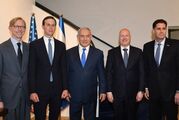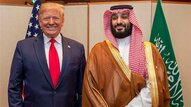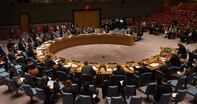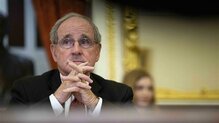26 july 2019

L-R) US special representative for Iran, Brian Hook, Trump adviser Jared Kushner, Israeli Prime Minister Benjamin Netanyahu, US Mideast peace envoy Jason Greenblatt and Israel's US envoy Ron Dermer, in Jerusalem.
By Iqbal Jassat
Is South Africa among the countries standing aside as the world is confronted with illegal moves by the Trump Administration to facilitate the complete annihilation of Palestine by Israel?
Notwithstanding the fact that the ANC-led government headed by President Cyril Ramaphosa has not backtracked on the decision to downgrade its embassy in Tel Aviv, not much more is evident in defense of Palestinian rights.
Silence is not an option at a time when United Nations investigator Michael Lynk has warned that Israel is moving rapidly to annex more of the Occupied West Bank as it intensifies settlement-building on Palestinian land.
Speaking to Mondoweiss during a week-long fact-finding visit to the region, Lynk claimed that Israel’s settlement-building was at its “highest level in recent years”.
“It’s moving much more rapidly and on the horizon is something much more dramatic,” said the UN’s special rapporteur for the situation of human rights in the Palestinian territory.
“The public statements made by senior American diplomats in favor of the long-expressed wish by senior Israeli political leaders, including virtually every member of the Israeli cabinet, in favor of annexation of some parts of the West Bank has only gotten louder. There is a greater normalization of the concept of annexation.”
As on previous visits, the Canadian law professor was denied entry to Palestine by Israeli officials — a decision he criticized as “contrary to Israel’s obligations as a UN member to cooperate fully with experts” from the world body.
Looking on in abject silence as South Africa appears to be doing while reports of demolitions of Palestinian homes reveal that illegal land-grabs are continuing at a frightening rate, is disconcerting.
In sharp contrast to Pretoria’s weak-kneed inaction, the Trump administration is on the go backing Israel to the hilt. In clear defiance of United Nations Resolutions which prohibit Israel’s settlement-activities, David Friedman, Washington’s ambassador to Israel, said Israel was entitled to annex at least “some” of the Palestinian West Bank.
Important to note that Friedman was a bankruptcy lawyer, who headed the Trump Empire before landing his current position. Not surprising too that as an ardent extremist Zionist, he has been involved in supporting and financing settlements.
Since ascending to power, U.S. President Donald Trump has surrounded himself with appointees who are unashamed white supremacists. In addition to their bigoted views, they are known as hawks willing to do Israel’s bidding at any cost. Including at the expense of American citizens’ interest.
In contrast to Trump’s “America First” policies, rogue elements within his inner circle have pursued an agenda which insists on “Israel First”. These neocons hold key positions of power as is evident in the portfolios held by Bolton, Pompeo, Greenblatt, Pence, Friedman, and Kushner among others.
For Netanyahu, having a team of unabashed Zionists embedded within the Trump administration was an opportunity to eliminate any prospect of Palestinian statehood. Thus without wasting any time and in defiance of UN Resolutions, he, in cahoots with Israel’s “White House dream team”, rushed to ensure that new facts on the ground will “legalize” the apartheid regime’s current and future status.
Thus we saw Trump having recognized Jerusalem as the capital of Israel, moved the US embassy there, cut funding to Palestinians and recognized Israeli sovereignty over the Golan Heights.
According to Link, Israel has “already crossed the bright red line into illegality”.
In tandem with the expansion of Israel’s massive settlements in the Occupied Palestinian Territories, Trump’s son-in-law Jared Kushner set up the first phase of what’s been dubbed as a sell-out of Palestine’s freedom struggle.
Hosted by Bahrain and co-sponsored by Saudi Arabia and the UAE, the Kushner plot seeks to fulfill Zionist ambitions of a Jewish state unfettered by the legitimate demands of the indigenous Palestinian inhabitants, whom it dispossessed and occupied.
Though the US-led conference in Bahrain was presented as providing huge economic advantages for stateless Palestinians, it is actually designed to bluff them and the world into believing that peace can be bought. In other words, keep the prisoner chained and handcuffed and hope that swopping the brass chains and cuffs to gold will buy the prisoner’s silence.
The politics of the so-called economic deal is to enslave the Palestinian people to a lifetime of misery, disenfranchised and ghettoized in bantustans. Though Kushner is feted in the Arab capitals of America’s client-states as an ally of their respective regime’s despotic rulers, as far as Palestinians are concerned, he is an ardent Zionist who backs and finances Israel’s illegal colony-settlements.
Netanyahu may be smarting that he has successfully manipulated Trump and his team to rubber stamp Zionist goals. Not only that but also that he has Arab dictators in his pocket. But the concern Palestinians have expressed centers on the silence of friends, especially South Africa.
Treachery by Arab dictators is to be expected but not the silence of a country who offered the world legendary human rights icons such as Nelson Mandela, Oliver Tambo, Yusuf Dadoo, Joe Slovo, Chris Hani, Robert Sobukwe, Steve Biko and many more.
– Iqbal Jassat is an Executive Member of the South Africa-based Media Review Network. He contributed this article to The Palestine Chronicle. Visit: www.mediareviewnet.com
By Iqbal Jassat
Is South Africa among the countries standing aside as the world is confronted with illegal moves by the Trump Administration to facilitate the complete annihilation of Palestine by Israel?
Notwithstanding the fact that the ANC-led government headed by President Cyril Ramaphosa has not backtracked on the decision to downgrade its embassy in Tel Aviv, not much more is evident in defense of Palestinian rights.
Silence is not an option at a time when United Nations investigator Michael Lynk has warned that Israel is moving rapidly to annex more of the Occupied West Bank as it intensifies settlement-building on Palestinian land.
Speaking to Mondoweiss during a week-long fact-finding visit to the region, Lynk claimed that Israel’s settlement-building was at its “highest level in recent years”.
“It’s moving much more rapidly and on the horizon is something much more dramatic,” said the UN’s special rapporteur for the situation of human rights in the Palestinian territory.
“The public statements made by senior American diplomats in favor of the long-expressed wish by senior Israeli political leaders, including virtually every member of the Israeli cabinet, in favor of annexation of some parts of the West Bank has only gotten louder. There is a greater normalization of the concept of annexation.”
As on previous visits, the Canadian law professor was denied entry to Palestine by Israeli officials — a decision he criticized as “contrary to Israel’s obligations as a UN member to cooperate fully with experts” from the world body.
Looking on in abject silence as South Africa appears to be doing while reports of demolitions of Palestinian homes reveal that illegal land-grabs are continuing at a frightening rate, is disconcerting.
In sharp contrast to Pretoria’s weak-kneed inaction, the Trump administration is on the go backing Israel to the hilt. In clear defiance of United Nations Resolutions which prohibit Israel’s settlement-activities, David Friedman, Washington’s ambassador to Israel, said Israel was entitled to annex at least “some” of the Palestinian West Bank.
Important to note that Friedman was a bankruptcy lawyer, who headed the Trump Empire before landing his current position. Not surprising too that as an ardent extremist Zionist, he has been involved in supporting and financing settlements.
Since ascending to power, U.S. President Donald Trump has surrounded himself with appointees who are unashamed white supremacists. In addition to their bigoted views, they are known as hawks willing to do Israel’s bidding at any cost. Including at the expense of American citizens’ interest.
In contrast to Trump’s “America First” policies, rogue elements within his inner circle have pursued an agenda which insists on “Israel First”. These neocons hold key positions of power as is evident in the portfolios held by Bolton, Pompeo, Greenblatt, Pence, Friedman, and Kushner among others.
For Netanyahu, having a team of unabashed Zionists embedded within the Trump administration was an opportunity to eliminate any prospect of Palestinian statehood. Thus without wasting any time and in defiance of UN Resolutions, he, in cahoots with Israel’s “White House dream team”, rushed to ensure that new facts on the ground will “legalize” the apartheid regime’s current and future status.
Thus we saw Trump having recognized Jerusalem as the capital of Israel, moved the US embassy there, cut funding to Palestinians and recognized Israeli sovereignty over the Golan Heights.
According to Link, Israel has “already crossed the bright red line into illegality”.
In tandem with the expansion of Israel’s massive settlements in the Occupied Palestinian Territories, Trump’s son-in-law Jared Kushner set up the first phase of what’s been dubbed as a sell-out of Palestine’s freedom struggle.
Hosted by Bahrain and co-sponsored by Saudi Arabia and the UAE, the Kushner plot seeks to fulfill Zionist ambitions of a Jewish state unfettered by the legitimate demands of the indigenous Palestinian inhabitants, whom it dispossessed and occupied.
Though the US-led conference in Bahrain was presented as providing huge economic advantages for stateless Palestinians, it is actually designed to bluff them and the world into believing that peace can be bought. In other words, keep the prisoner chained and handcuffed and hope that swopping the brass chains and cuffs to gold will buy the prisoner’s silence.
The politics of the so-called economic deal is to enslave the Palestinian people to a lifetime of misery, disenfranchised and ghettoized in bantustans. Though Kushner is feted in the Arab capitals of America’s client-states as an ally of their respective regime’s despotic rulers, as far as Palestinians are concerned, he is an ardent Zionist who backs and finances Israel’s illegal colony-settlements.
Netanyahu may be smarting that he has successfully manipulated Trump and his team to rubber stamp Zionist goals. Not only that but also that he has Arab dictators in his pocket. But the concern Palestinians have expressed centers on the silence of friends, especially South Africa.
Treachery by Arab dictators is to be expected but not the silence of a country who offered the world legendary human rights icons such as Nelson Mandela, Oliver Tambo, Yusuf Dadoo, Joe Slovo, Chris Hani, Robert Sobukwe, Steve Biko and many more.
– Iqbal Jassat is an Executive Member of the South Africa-based Media Review Network. He contributed this article to The Palestine Chronicle. Visit: www.mediareviewnet.com

Yemen’s Ansarullah movement says the US is not just arming the Saudi-led coalition, but is actively participating in its brutal war against the innocent Yemenis.
“The gravity of the American role doesn’t come from the arms sales, but the participation in the aggression against Yemen, and also in trying to legitimize that aggression,” said Mohammed al-Bukhtaiti, a senior member of the the Political Bureau of the Ansarullah movement.
His comments come as American troops are coming back 16 years after they left Saudi Arabia, King Salman bin Abdul-Aziz Al Saud announced last week. According to media reports hundreds of American troops are deploying to Prince Sultan Air Base outside Riyadh.
Back on Wednesday, Ansarullah spokesman Mohammed Abdul-Salam told Al-Masirah TV that the deployment of US troops is aimed at providing security support and boosting the morale of Saudi Arabia against the ballistic missiles and drone attacks of Yemen.
In their latest retaliatory attack on Saudi targets, the Yemeni army’s UAVs once again hit a Saudi airport in Asir province on Thursday night. The army said the pinpoint attack on the airport and nearby military sites in the city of Abha was conducted by Qasef K-2 drones.
The Saudi-led coalition claimed the drone was intercepted and that no airports or military sites had been hit.
Yemeni forces have stepped up their retaliatory strikes against Saudi Arabia to force the regime to stop its military campaign against the Yemeni people.
US President Donald Trump on Wednesday vetoed three congressional resolutions barring billions of dollars in weapons sales to Saudi Arabia and the United Arab Emirates, which have been committing war crimes in Yemen for over four years.
Referring to the decision, Ansarullah’s Bukhaiti said, “If the US Congress manages to block the US arms sales to Saudi Arabia, it will be the end for the economic benefits for America, and this may lead to a change in the US policy regarding its participation in the aggression, and its efforts to legitimize it.”
In veto messages to Congress released by the White House on Wednesday, Trump argued that the bills would “weaken America’s global competitiveness and damage the important relationships we share with our allies and partners.”
Thousands of Yemenis, mostly civilians, have been killed by the Saudi aggression and the ensuing famine since 2015.
“The Yemeni people are subjected to an unjust and brutal aggression, and that has resulted in the deaths of thousands due to famine. And the US has to reconsider because it’s a partner in this humanitarian crisis,” Bukhaiti said.
“The gravity of the American role doesn’t come from the arms sales, but the participation in the aggression against Yemen, and also in trying to legitimize that aggression,” said Mohammed al-Bukhtaiti, a senior member of the the Political Bureau of the Ansarullah movement.
His comments come as American troops are coming back 16 years after they left Saudi Arabia, King Salman bin Abdul-Aziz Al Saud announced last week. According to media reports hundreds of American troops are deploying to Prince Sultan Air Base outside Riyadh.
Back on Wednesday, Ansarullah spokesman Mohammed Abdul-Salam told Al-Masirah TV that the deployment of US troops is aimed at providing security support and boosting the morale of Saudi Arabia against the ballistic missiles and drone attacks of Yemen.
In their latest retaliatory attack on Saudi targets, the Yemeni army’s UAVs once again hit a Saudi airport in Asir province on Thursday night. The army said the pinpoint attack on the airport and nearby military sites in the city of Abha was conducted by Qasef K-2 drones.
The Saudi-led coalition claimed the drone was intercepted and that no airports or military sites had been hit.
Yemeni forces have stepped up their retaliatory strikes against Saudi Arabia to force the regime to stop its military campaign against the Yemeni people.
US President Donald Trump on Wednesday vetoed three congressional resolutions barring billions of dollars in weapons sales to Saudi Arabia and the United Arab Emirates, which have been committing war crimes in Yemen for over four years.
Referring to the decision, Ansarullah’s Bukhaiti said, “If the US Congress manages to block the US arms sales to Saudi Arabia, it will be the end for the economic benefits for America, and this may lead to a change in the US policy regarding its participation in the aggression, and its efforts to legitimize it.”
In veto messages to Congress released by the White House on Wednesday, Trump argued that the bills would “weaken America’s global competitiveness and damage the important relationships we share with our allies and partners.”
Thousands of Yemenis, mostly civilians, have been killed by the Saudi aggression and the ensuing famine since 2015.
“The Yemeni people are subjected to an unjust and brutal aggression, and that has resulted in the deaths of thousands due to famine. And the US has to reconsider because it’s a partner in this humanitarian crisis,” Bukhaiti said.
25 july 2019
To become law, the legislation must still pass the whole Senate, as well as the US House of Representatives and either be signed by Trump or gather the two-thirds majorities in both chambers of Congress to override a veto.
Historically, Congress has overridden fewer than ten percent of all presidential vetoes.
The measure was co-sponsored by Senator Bob Menendez, the top Democrat in the Senate Foreign Relations Committee, as well as Republican Senators Lindsey Graham and Todd Young.
The committee’s chairman, Republican Senator Jim Risch, opposed the bill, saying he wanted legislation to hold Riyadh accountable but argued that there was no point in passing a bill that Trump would veto.
On Wednesday, Trump vetoed three congressional resolutions barring billions of dollars in weapons sales to Saudi Arabia and the United Arab Emirates, which have been committing war crimes in Yemen for over four years.
In a statement released by the White House, Trump argued that the bills would “weaken America’s global competitiveness and damage the important relationships we share with our allies and partners.”
Many members of Congress have sought to hold Saudi Arabia accountable for its human rights abuses, including last year’s murder of dissident journalist Jamal Khashoggi in Istanbul, Turkey, as well as the Saudi-led war in Yemen, which has led to a humanitarian catastrophe.
Leading a coalition of its allies, Saudi Arabia invaded Yemen in March 2015 in an attempt to reinstall the former regime, which had been friendly to Riyadh, but whose officials fled the country.
The aggression is estimated to have left 56,000 Yemenis dead and has taken a heavy toll on the country’s infrastructure, destroying hospitals, schools, and factories.
The UN has said that a record 22.2 million Yemenis are in dire need of food, including 8.4 million threatened by severe hunger. According to the world body, Yemen is suffering from the most severe famine in more than 100 years.
Historically, Congress has overridden fewer than ten percent of all presidential vetoes.
The measure was co-sponsored by Senator Bob Menendez, the top Democrat in the Senate Foreign Relations Committee, as well as Republican Senators Lindsey Graham and Todd Young.
The committee’s chairman, Republican Senator Jim Risch, opposed the bill, saying he wanted legislation to hold Riyadh accountable but argued that there was no point in passing a bill that Trump would veto.
On Wednesday, Trump vetoed three congressional resolutions barring billions of dollars in weapons sales to Saudi Arabia and the United Arab Emirates, which have been committing war crimes in Yemen for over four years.
In a statement released by the White House, Trump argued that the bills would “weaken America’s global competitiveness and damage the important relationships we share with our allies and partners.”
Many members of Congress have sought to hold Saudi Arabia accountable for its human rights abuses, including last year’s murder of dissident journalist Jamal Khashoggi in Istanbul, Turkey, as well as the Saudi-led war in Yemen, which has led to a humanitarian catastrophe.
Leading a coalition of its allies, Saudi Arabia invaded Yemen in March 2015 in an attempt to reinstall the former regime, which had been friendly to Riyadh, but whose officials fled the country.
The aggression is estimated to have left 56,000 Yemenis dead and has taken a heavy toll on the country’s infrastructure, destroying hospitals, schools, and factories.
The UN has said that a record 22.2 million Yemenis are in dire need of food, including 8.4 million threatened by severe hunger. According to the world body, Yemen is suffering from the most severe famine in more than 100 years.

US President Donald Trump has vetoed three congressional resolutions barring billions of dollars in weapons sales to Saudi Arabia and the United Arab Emirates, which have been committing war crimes in Yemen for over four years.
In veto messages to Congress released by the White House on Wednesday, Trump argued that the bills would “weaken America’s global competitiveness and damage the important relationships we share with our allies and partners.”
Back in May, the Trump administration invoked an emergency provision of the law governing arms sales to push for the sale of $8.1 billion worth of munitions in 22 pending transfers to Saudi Arabia and the UAE and Jordan without the typical 30-day congressional review period.
It claimed that the export was crucial to protect the region against what it called “the malign influence” of Iran.
However, the move infuriated American lawmakers, who slammed the Trump administration for attempting to bypass Congress.
Many members of Congress have grown alarmed by the brutal Saudi-led military aggression on Yemen, which has killed thousands of civilians since early 2015 and created the world’s worst humanitarian crisis in the impoverished country.
They have also censured the Riyadh-sponsored killing of Saudi journalist Jamal Khashoggi in the kingdom’s consulate in Istanbul, Turkey, last October, as well as Trump’s inaction on the crime.
The three resolutions had been approved by the House of Representatives last week. They had previously passed the Senate in what was viewed as a bipartisan pushback to Trump’s foreign policy.
In his veto messages, Trump claimed that the resolutions were an “ill-conceived and time-consuming” way to address concerns about the war on Yemen.
Representative Eliot Engel, a Democrat from New York who is the chairman of the House Committee on Foreign Affairs, denounced Trump’s decision to veto the bills.
“The President’s veto sends a grim message that America’s foreign policy is no longer rooted in our core values — namely a respect for human rights — and that he views Congress not as a coequal branch of government, but an irritant to be avoided or ignored,” he said.
“Worse still, this veto is going to cost innocent lives. These weapons are going to continue fueling a reckless and brutal campaign of violence and exacerbating the world's worst humanitarian catastrophe," he added.
Saudi Arabia is the United States’ largest arms client, with over $129 billion in approved purchases.
UK gives green light to $800m in Saudi arms sales
In a separate development, a new analysis from the Campaign Against the Arms Trade (CAAT) revealed that the UK, which is — along the US — among the Riyadh regime’s arms suppliers had approved over $800 million worth of arms license exports to Saudi Arabia between in October 2018 and March 2019.
The sales came despite a ruling by the Court of Appeal in June that states British arms sales to the Riyadh regime are unlawful.
Andrew Smith, of the Campaign Against the Arms Trade (CAAT), said, “At the same time as the Saudi regime was covering up his (Khashoggi’s) murder ministers were approving hundreds of millions of pounds worth of arms.”
“UK-made weapons have played a devastating role in the bombing of Yemen. Tens of thousands of people have been killed and vital infrastructure has been destroyed. The destruction wouldn’t have been possible without the complicity and support of arms dealing governments like the UK,” he added.
In veto messages to Congress released by the White House on Wednesday, Trump argued that the bills would “weaken America’s global competitiveness and damage the important relationships we share with our allies and partners.”
Back in May, the Trump administration invoked an emergency provision of the law governing arms sales to push for the sale of $8.1 billion worth of munitions in 22 pending transfers to Saudi Arabia and the UAE and Jordan without the typical 30-day congressional review period.
It claimed that the export was crucial to protect the region against what it called “the malign influence” of Iran.
However, the move infuriated American lawmakers, who slammed the Trump administration for attempting to bypass Congress.
Many members of Congress have grown alarmed by the brutal Saudi-led military aggression on Yemen, which has killed thousands of civilians since early 2015 and created the world’s worst humanitarian crisis in the impoverished country.
They have also censured the Riyadh-sponsored killing of Saudi journalist Jamal Khashoggi in the kingdom’s consulate in Istanbul, Turkey, last October, as well as Trump’s inaction on the crime.
The three resolutions had been approved by the House of Representatives last week. They had previously passed the Senate in what was viewed as a bipartisan pushback to Trump’s foreign policy.
In his veto messages, Trump claimed that the resolutions were an “ill-conceived and time-consuming” way to address concerns about the war on Yemen.
Representative Eliot Engel, a Democrat from New York who is the chairman of the House Committee on Foreign Affairs, denounced Trump’s decision to veto the bills.
“The President’s veto sends a grim message that America’s foreign policy is no longer rooted in our core values — namely a respect for human rights — and that he views Congress not as a coequal branch of government, but an irritant to be avoided or ignored,” he said.
“Worse still, this veto is going to cost innocent lives. These weapons are going to continue fueling a reckless and brutal campaign of violence and exacerbating the world's worst humanitarian catastrophe," he added.
Saudi Arabia is the United States’ largest arms client, with over $129 billion in approved purchases.
UK gives green light to $800m in Saudi arms sales
In a separate development, a new analysis from the Campaign Against the Arms Trade (CAAT) revealed that the UK, which is — along the US — among the Riyadh regime’s arms suppliers had approved over $800 million worth of arms license exports to Saudi Arabia between in October 2018 and March 2019.
The sales came despite a ruling by the Court of Appeal in June that states British arms sales to the Riyadh regime are unlawful.
Andrew Smith, of the Campaign Against the Arms Trade (CAAT), said, “At the same time as the Saudi regime was covering up his (Khashoggi’s) murder ministers were approving hundreds of millions of pounds worth of arms.”
“UK-made weapons have played a devastating role in the bombing of Yemen. Tens of thousands of people have been killed and vital infrastructure has been destroyed. The destruction wouldn’t have been possible without the complicity and support of arms dealing governments like the UK,” he added.

The United States on Wednesday blocked an attempt by Kuwait, Indonesia and South Africa to have the UN Security Council adopt a resolution condemning Israel’s demolition of Palestinian homes in Sur Baher town, on the outskirts of Occupied Jerusalem.
Ignoring widespread international criticism, the Israeli occupation authority (IOA) embarked last Monday on demolishing dozens of homes in the Palestinian town of Sur Baher near the separation wall in Jerusalem.
The IOA claims the homes, which are close to the separation barrier that criss-crosses the West Bank and is locally referred to by Palestinians as the "apartheid wall,” a security risk.
According to Reuters, Kuwait, Indonesia and South Africa circulated a five-paragraph draft statement at the 15-member Security Council on Tuesday that expressed grave concern and warned that the demolitions “undermines the viability of the two-state solution and the prospect for just and lasting peace.”
Such statements have to be agreed by consensus and on Wednesday the US told its council counterparts it could not support the text before another revised three-paragraph draft statement was circulated, but the US again rejected the text.
In this regard, the UN demanded Israel to halt its demolition policy and confiscation of homes in Jerusalem and the West Bank.
Addressing the UN Security Council last Tuesday, Rosemary DiCarlo, head of the UN's Department of Political and Peacebuilding Affairs, said Israel’s recent demolitions breached international rules and had hurt the livelihoods of some 300 Palestinian locals.
"Israel's policy of destroying Palestinian property is not compatible with its obligations under international humanitarian law and contributes to the risk of forcible transfer facing many Palestinians in the West Bank," DiCarlo added.
Ignoring widespread international criticism, the Israeli occupation authority (IOA) embarked last Monday on demolishing dozens of homes in the Palestinian town of Sur Baher near the separation wall in Jerusalem.
The IOA claims the homes, which are close to the separation barrier that criss-crosses the West Bank and is locally referred to by Palestinians as the "apartheid wall,” a security risk.
According to Reuters, Kuwait, Indonesia and South Africa circulated a five-paragraph draft statement at the 15-member Security Council on Tuesday that expressed grave concern and warned that the demolitions “undermines the viability of the two-state solution and the prospect for just and lasting peace.”
Such statements have to be agreed by consensus and on Wednesday the US told its council counterparts it could not support the text before another revised three-paragraph draft statement was circulated, but the US again rejected the text.
In this regard, the UN demanded Israel to halt its demolition policy and confiscation of homes in Jerusalem and the West Bank.
Addressing the UN Security Council last Tuesday, Rosemary DiCarlo, head of the UN's Department of Political and Peacebuilding Affairs, said Israel’s recent demolitions breached international rules and had hurt the livelihoods of some 300 Palestinian locals.
"Israel's policy of destroying Palestinian property is not compatible with its obligations under international humanitarian law and contributes to the risk of forcible transfer facing many Palestinians in the West Bank," DiCarlo added.
24 july 2019

American journalist and advice columnist E. Jean Carroll
Columnist E. Jean Carroll, who has accused President Trump of raping her 23 years ago, expressed frustration Wednesday that the many allegations of sexual assault against Trump have not received as much attention as former special counsel Robert Mueller. tweet
The tweet came as Mueller was wrapping up his highly anticipated congressional testimony, during which he reiterated his office's conclusions on alleged Russian election meddling and possible obstruction of justice from Trump.
Columnist E. Jean Carroll, who has accused President Trump of raping her 23 years ago, expressed frustration Wednesday that the many allegations of sexual assault against Trump have not received as much attention as former special counsel Robert Mueller. tweet
The tweet came as Mueller was wrapping up his highly anticipated congressional testimony, during which he reiterated his office's conclusions on alleged Russian election meddling and possible obstruction of justice from Trump.

US President Donald Trump’s Middle East envoy faces strong criticism from members of the UN Security Council, including Washington’s own allies, after he downplayed the world body’s resolutions on the Middle East conflict and said the Israeli-Palestinian issue cannot be resolved by relying on “fictions” of global consensus.
Addressing a UNSC meeting in New York on Tuesday, Jason Greenblatt dismissed the notion that international law and UN resolutions must serve as the foundation of any solution to the decades-long Israeli-Palestinian conflict.
Greenblatt said the issue will not be settled by references to international law, which he called “inconclusive.”
“A comprehensive and lasting peace will not be created by fiat of international law or by these heavily wordsmithed, unclear resolutions,” he said. “The vision for peace that we plan to present will not be ambiguous, unlike many resolutions that have passed in this chamber,” referring to the so-called peace plan Washington had been developing without Palestine’s consent to end the conflict.
Greenblatt also noted that the upcoming plan — which Trump himself calls the “deal of the century” — would not be based on “fictions of international consensus” as it is often “nothing more than a mask for inaction.”
“So let’s stop kidding ourselves. If a so-called international consensus had been able to resolve the Israeli-Palestinian conflict, it would have done so decades ago. It didn’t,” he added.
His controversial comments against international law triggered strong rebuttals from the UNSC’s four other permanent members, namely France, Britain, Germany and Russia.
Security Council members, in response, underlined the need for respecting international law and UN resolutions in efforts to resolve the Palestine issue.
Germany’s UN Ambassador Christoph Heusgen stressed that UNSC resolutions are binding under international law, saying, “For us, international law is not menu a la carte.”
“For us, international law is relevant; international law is not futile,” he said. “We believe in the force of international law; we do not believe in the force of the strongest.”
British representative Karen Pierce also reminded all countries that they “have a responsibility” to implement UNSC resolutions.
Similarly, Russia’s UN envoy challenged Greenblatt’s assertions.
“This international consensus is international law, because Security Council resolutions are international law — they merely need to be complied with,” Vassily Nebenzia said. “The matter lies not with a lack of international consensus; rather the matter has to do with the fact that there is utter disregard for this internationally-acknowledged consensus by the United States at present.”
Moreover, French UN Ambassador Nicolas de Riviere emphasized that Paris would support any peace effort “so long as this aligns with the approach that we have set out together, so long as this adheres to international law, specifically all resolutions of the Security Council.”
Greenblatt, has worked with Jared Kushner, Trump’s son-in-law and senior adviser, on the US president’s highly-contentious “peace” deal, which the Palestinians have already dismissed “the slap of the century.”
The economic section of Trump’s proposal was released during a Washington-sponsored conference in Manama, Bahrain, on June 25-26 despite a Palestinian boycott of the event.
Critics say Washington is offering financial rewards for Palestinians to accept the Israeli occupation. Palestine, similarly, called that a “humiliating blackmail.”
Addressing a UNSC meeting in New York on Tuesday, Jason Greenblatt dismissed the notion that international law and UN resolutions must serve as the foundation of any solution to the decades-long Israeli-Palestinian conflict.
Greenblatt said the issue will not be settled by references to international law, which he called “inconclusive.”
“A comprehensive and lasting peace will not be created by fiat of international law or by these heavily wordsmithed, unclear resolutions,” he said. “The vision for peace that we plan to present will not be ambiguous, unlike many resolutions that have passed in this chamber,” referring to the so-called peace plan Washington had been developing without Palestine’s consent to end the conflict.
Greenblatt also noted that the upcoming plan — which Trump himself calls the “deal of the century” — would not be based on “fictions of international consensus” as it is often “nothing more than a mask for inaction.”
“So let’s stop kidding ourselves. If a so-called international consensus had been able to resolve the Israeli-Palestinian conflict, it would have done so decades ago. It didn’t,” he added.
His controversial comments against international law triggered strong rebuttals from the UNSC’s four other permanent members, namely France, Britain, Germany and Russia.
Security Council members, in response, underlined the need for respecting international law and UN resolutions in efforts to resolve the Palestine issue.
Germany’s UN Ambassador Christoph Heusgen stressed that UNSC resolutions are binding under international law, saying, “For us, international law is not menu a la carte.”
“For us, international law is relevant; international law is not futile,” he said. “We believe in the force of international law; we do not believe in the force of the strongest.”
British representative Karen Pierce also reminded all countries that they “have a responsibility” to implement UNSC resolutions.
Similarly, Russia’s UN envoy challenged Greenblatt’s assertions.
“This international consensus is international law, because Security Council resolutions are international law — they merely need to be complied with,” Vassily Nebenzia said. “The matter lies not with a lack of international consensus; rather the matter has to do with the fact that there is utter disregard for this internationally-acknowledged consensus by the United States at present.”
Moreover, French UN Ambassador Nicolas de Riviere emphasized that Paris would support any peace effort “so long as this aligns with the approach that we have set out together, so long as this adheres to international law, specifically all resolutions of the Security Council.”
Greenblatt, has worked with Jared Kushner, Trump’s son-in-law and senior adviser, on the US president’s highly-contentious “peace” deal, which the Palestinians have already dismissed “the slap of the century.”
The economic section of Trump’s proposal was released during a Washington-sponsored conference in Manama, Bahrain, on June 25-26 despite a Palestinian boycott of the event.
Critics say Washington is offering financial rewards for Palestinians to accept the Israeli occupation. Palestine, similarly, called that a “humiliating blackmail.”
Page: 29 - 28 - 27 - 26 - 25 - 24 - 23 - 22 - 21 - 20 - 19 - 18 - 17 - 16 - 15 - 14 - 13 - 12 - 11 - 10 - 9 - 8


